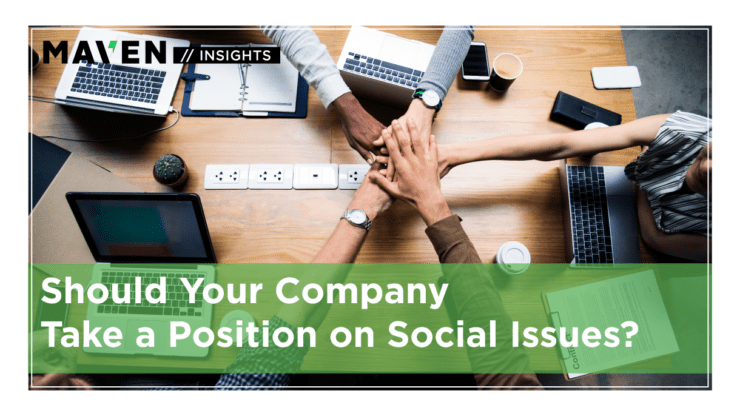Today, we’ll be discussing whether or not organizations should take a stand on issues that are unrelated to their business.
You’ve seen it. I’ve seen it. We’ve all seen it. Email campaigns, social media posts, letters to stakeholders outlining a company’s support for diversity, inclusion and specifically the Black Lives Matter movement. On June 3rd Maven even issued our own statement on the current situation.
In today’s polarized environment, should every organization expect to take a stand on an issue, even if it’s unrelated to their business?
Over the last decade, the expected role of corporations on social issues has shifted and accelerated in 2020. A study recently released by Kantar Monitor found that 68% consumers surveyed expect brands to be clear about their values. And that percentage raises depending on a consumer’s ethnicity, demographic group and age.
According the USC Annenberg’s Center for Public Relations 2020 Global Communications Report, “today’s activists aren’t interested in lip service from corporations, politicians or peers. The goals go beyond just raising awareness for a cause – they are rooted in achieving authentic social and political change.”
That means if a company is going to make a statement and take a stand, it needs to be authentic.

The problem is, a lot, if not most companies who have put their stake in the ground around Black Lives Matter are doing no more than just creating moving marketing campaigns. They’re not making any real change. And it’s not clear that they intend to.
If even Fortune 500 companies with ample budgets still miss the mark, should smaller companies attempt to take a stand?
As long as it’s authentic, yes, take a stand, stake your claim, make a statement. It’s okay if a company’s statement is aspirational, as long as a plan is in place to create real change. Authenticity is critical in gaining consumer confidence and loyalty. If your employees, customers, or other stakeholders know it’s not true, they’re going to call you out. If there’s one thing that marketers have seen from the rise of Black Lives Matter, it’s the acceptance of calling out individuals and corporations who aren’t living up to the standards that they’re preaching.
As an organization, if you’re ready to take a stand on an issue but aren’t sure about what to do or where to start, collaborate with the people who do. Involve activist groups or community members who have a real pulse on what’s happening and how it’s affecting the community. Thoughtful companies will seek activist partners that align with their values and their business to build programs that matter. An added bonus is that collaboration with activist groups allows an organization to prepare a response to potentially negative feedback.
Another important group to involve in the decision-making process are employees. Too often senior leadership will make decisions or create programs without ever consulting the individuals or groups who will be most affected. As in the case of Black Lives Matter, many employees are out there protesting and taking a personal stand. Who better to consult than those who are part of the movement?
The bottom line is that if an organization decides to take a stand on an issue, it needs to be thoughtful and meaningful. Consumers and stakeholders will hold your organization accountable.
Thanks for reading our Insight on organizations taking a stand on issues unrelated to their business. Check out Alexa’s Insight for some tips on how businesses should navigate social media during a crisis.
Posted In Public Relations
 Jessica Sharp
Jessica Sharp 